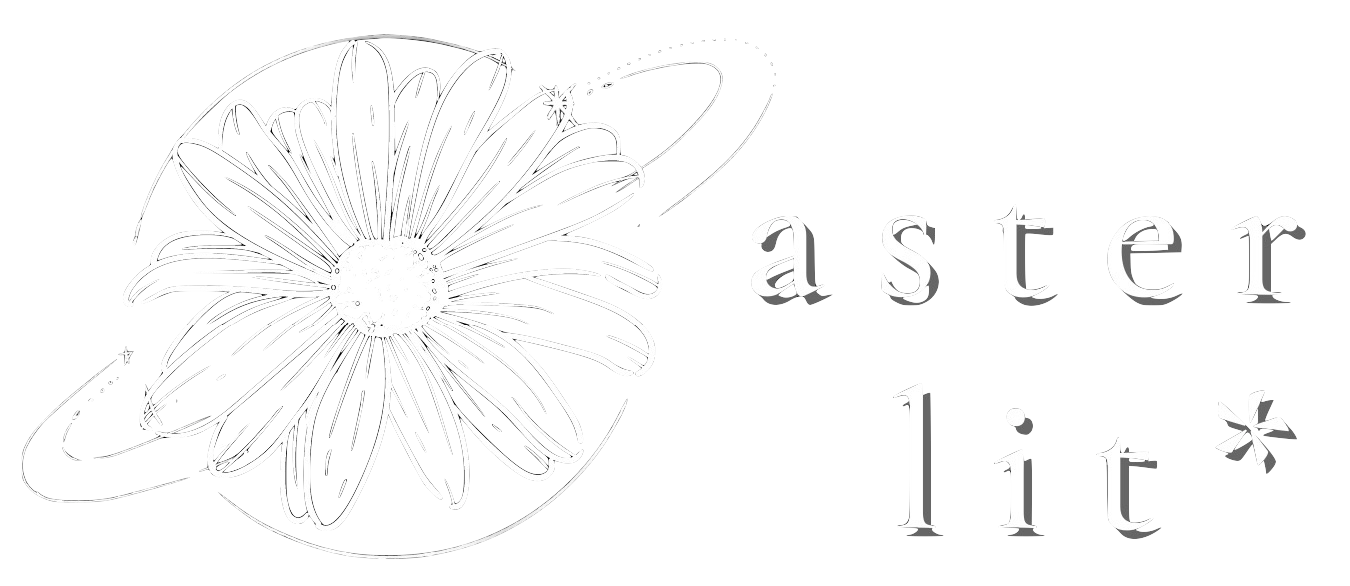
Aster Lit: Apricity
Issue 4—Winter 2021
Sit At My Table
Aribah Ali, Canada
The winter sun, drunken and delirious, spilled onto the checkered kitchen tiles. The evening sun that had lingered during his infancy as his mother perched him onto the counter, bringing the ladle to his lips ever so kindly, hand cupped beneath his chin. Her cheeks hollowed several times over the spoonful, before letting his mouth close around it.
“Mama, it has already gone cold,” he would say, although more patient to acts of love then he had now become.
And her eyes would brim with fondness. “How would I live with myself if I burned my darling sweetheart baby’s tongue?”
Although it had been over a decade since they sat together in this kitchen, as he saw her look through the small window above the sink, and as the golden light fell gracefully through clumsy jars of jams and jellies and marmalades placed on the countertop, he felt his tongue burn. “What will one more wound do?” he wanted to say.
Here he is once again, eagerly watching his mother, impatient for food, impatient for love. Entirely starving and aggravated, and uglier and so much more like his father. His mother is also here, in spite of how tall he is now, still waiting for him. She is still beautiful and good and pouring all of her love into the soup simmering on the stove. He is a child again, and every piece
of him wants to devour every last drop, believing if his mother had made it, he could become good like her.
I never told you how sorry I was, he wanted to say. I am sorry for not having inherited your eyes. I am sorry for inheriting my father’s anger. I am sorry for inheriting my father’s war.
“Are you hungry?” She says this, and the sunlight of the kitchen weaves itself through her hair and ebbs across her lips with each honeyed word. The emeralds of her eyes are caught in gold like green leaves during August evenings, and it is in these moments, when the light falls on her face just right, that he can convince himself that he is still only a child, legs swinging impatiently as he licks the taste of chicken broth off his lips.
It is these moments, when time fractures through the window over the sink, where he can convince himself that all of this, all that he has become, is simply the cruelty of an infant’s dream. The late sunlight will weave itself into his hair and he will rip time apart where it is most tender. He will awake to the staleness of sleep in his mouth and the gentle pang of pots down the stairs. He will cry and his mother will come and kiss him between the shoulder blades. He would abandon all of his misgivings and curses, and instead adopt a child’s dialogue: Mama, look at this drawing I made. Mama, I have hurt myself and many others, make it better, please. Mama, I am still hungry. Mama, I want to have my fill of love, just once, even if I do not deserve it. Mama, rip me apart and glue me back with sunlight, have me once again, and this time I will be worthy of your love. Mama?
“Come here and have a taste,” she calls to him. “Tell me what is missing.”
He lifts himself onto the counter, and smells crushed garlic. He no longer needs his mother to hoist him up. In this golden hour, where time is broken, she looks decades younger and there is only hunger, spoilt and stubborn, in the pit of his stomach. She presses her lips together, and reaches for the ladle.
The smell of it fills the house, chopped scallions and onions on the cutting board, soup sizzling over a deep orange flame. Ribbons of steam waft from the pot into the kitchen, and his mother hollows her cheeks over the spoonful.
“Mother, it has already gone cold. You do it for far longer than needed.” He is grown now, and will not whine if he is burnt. He is grown now and he is sitting on the countertop, impatient for his mother to feed him.
Her fingers are gently placed beneath his chin. “What does it need? More lemon? More ginger?” she asks, spooning the broth into his mouth, and when it dribbles down his chin, she catches it with her ladle. There is an unbearable tenderness in the crinkles of her eyes, in the softness of her expression, so much so, that he feels the need to look away.
“No, it is perfect. I wish I could cook like you,” he says, and what he wanted to say, “I wish I looked more like you,” is left unsaid.
She laughs, standing on her toes to grab a large, elegant bowl in the pantry cupboard. “Will you set the table for me?”
He smooths the red table cloth and places the kitchenware just as she had taught him. There are flower vines carved into the silver of the spoon handles complimenting the red and gold flowers that surround the rims of the set of china. He sits at her table, and she fills his bowl first. Each bowl is steaming, and when he eagerly tries to eat, she chides him and says that it will burn his tongue. The distance between them can be measured in inches.
The kitchen is the heart of the household, and he had left his heart in one of these jam jars (or was it a jelly?) fourteen years ago. His mother once stood in the kitchen, cutting up three-fourths of an eggplant or adding a pinch of salt, and another, and another, licking the sauce from her fingertips all the while. There is still the lone recipe book from which she seeks guidance, although both mother and son have each word memorized. Squeeze a lemon, finely dice the onions, stroke your son’s hair, look at this food I made, look at me, look at me, love me, allow it to simmer until golden-brown, garnish with parsley.
Allow to cool and spoon gently into your ungrateful son’s mouth. The next time you see him, he will be taller than you, and he will pray that the soup is still the way he remembers.
(It is.)
Aribah is in the second year of her undergraduate degree. She enjoys writing post-war stories with added elements of magical realism. In her spare time, she enjoys listening to music and using such as inspiration for her own stories and characters.
